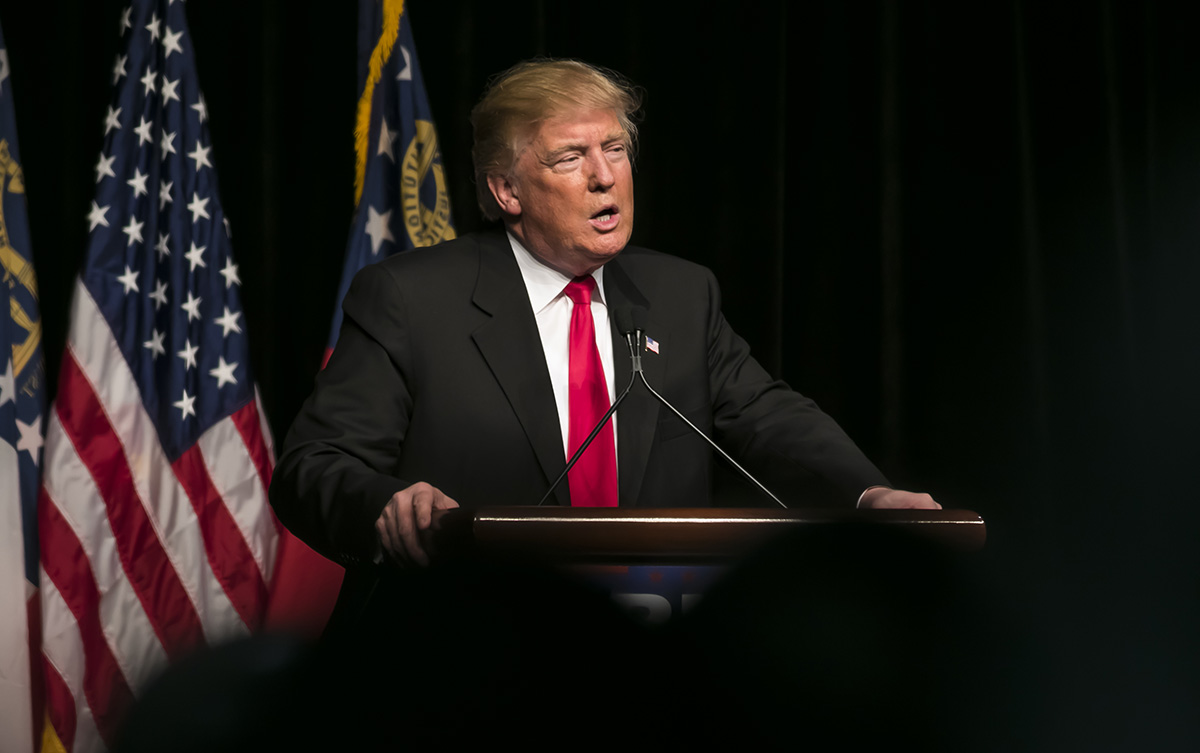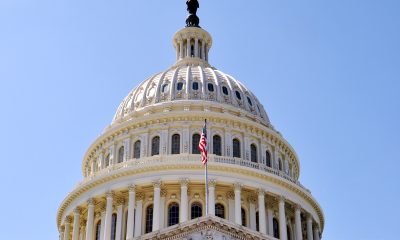National
Senate confirms lesbian to federal judiciary
Senators approve Nathan by 48-44 vote

The U.S. Senate confirmed on Thursday an out judicial nominee to become the second-ever open lesbian to sit on the federal bench.
Senators confirmed Alison Nathan, whom President Obama nominated in March for a seat on the U.S. District Court of the Southern District of New York, by a vote of 48-44.
Senate Judiciary Committee Chair Patrick Leahy (D-Vt.) said on the Senate floor there was “no question the Senate should confirm Ms. Nathan.”
“As her resume shows, she is an accomplished nominee with significant experience in private practice, academia and government service,” Leahy said. “Twenty-seven former Supreme Court clerks have written to the Judiciary Committee in support of Ms. Nathan’s qualifications, including clerks who worked for the conservative Justices.”
Shin Inouye, a White House spokesperson, commended the Senate for confirming Obama’s nominee.
“The President welcomes the confirmation of Alison Nathan,” Inouye said. “She will serve the American people well from the District Court bench.”
Currently special counsel to the Solicitor General of New York, Nathan has also served as a special assistant to President Obama and an associate White House counsel. Before joining government service, she taught law first as a visiting assistant professor at Fordham University Law School, and later as a Fritz Alexander fellow at New York University School of Law.
All Democratic senators who were present voted in favor of the nomination. All Republicans who were present voted against her, including GOP senators known for holding pro-LGBT views, such as Sens. Susan Collins (R-Maine), Olympia Snowe (R-Maine), Mark Kirk (R-Ill.) and Scott Brown (R-Mass.).
Senators who didn’t vote were Sens. Tom Coburn (R-Okla.), Joseph Lieberman (I-Conn.), Debbie Stabenow (D-Mich.), Kay Hagan (D-N.C.), Richard Lugar (R-Ind.), David Vitter (R-La.), Tom Harkin (D-Iowa) and Joe Manchin (D-W.V.).
The Senate didn’t confirm Nathan without opposition on the floor. Republican senators spoke out against her.
Sen. Charles Grassley (R-Iowa), ranking Republican on the Senate Judiciary Committee, said he voted to report Nathan’s nomination to the floor, but couldn’t vote for her on Thursday — as well as judicial nominee Judge Susan Hickey — because of their records and American Bar Association ratings.
“Ms. Nathan and Judge Hickey both have had limited experience in the courtroom,” Grassley said. “They have failed to meet even the minimum qualifications that the ABA uses in rating process.”
Sen. Jeff Sessions (R-Ala.), who’s known for opposing pro-LGBT initiatives in Congress, also expressed concerns on the floor about Nathan’s legal experience and what he said was her belief that judges can look to foreign law in deciding cases.
“It’s very hard for me to believe that I should vote to confirm a judge who’s not committed to following our law, who believes they have a right to scrutinize the world, find some law in some other country, bring it home, and use that law to make it achieve a result in the case they wanted,” Sessions said.
Leahy defended Nathan’s nomination on the Senate floor, saying although her ABA recommendation wasn’t unanimous, a majority on the standing committee that evaluated her said she was qualified.
“I note that a majority of the Standing Committee rated Ms. Nathan ‘qualified’ to serve,” Leahy said. “I also note that Ms. Nathan’s ABA rating is equal to or better than the rating received by 33 of President Bush’s confirmed judicial nominees, who were supported by nearly every Republican senator.”
Sen. Chuck Schumer (D-N.Y.) said the claim that Nathan has made any assertion that she’d look to foreign law when deciding cases is “patently false.”
In a questionnaire response to written questions from Grassley, Nathan wrote: “If I were confirmed as a United States District Court Judge, foreign law would have no relevance to my interpretation of the United States Constitution. In this area, as in all others, I would follow binding Supreme Court precedent.”
LGBT advocates praised the Senate for confirming Nathan and sending the third openly gay person to the federal bench.
Joe Solmonese, president of the Human Rights Campaign, hailed the confirmation and said additional representation of LGBT people in the courts is necessary.
“Alison Nathan’s demonstrated intellect and dedication to public service is a model of achievement for LGBT youth and we commend the Senate for their confirmation vote today,” he said. “With qualified LGBT attorneys all across the country, we look forward to the federal courts reflecting the diverse composition of our society in districts from coast to coast.”
Chuck Wolfe, CEO of the Gay & Lesbian Victory Fund, called the Nathan confirmation “another step toward America’s leadership class reflecting the country it serves.”
“For too long Washington has ignored the impressive talent and experience found in the LGBT community,” Wolfe said. “It’s been beholden to the opinion of extremists who wanted to exclude us. We have to continue to fight against that kind of political homophobia, and we will.”
The first lesbian — and first openly LGBT person — to sit on the federal bench is Deborah Batts, who was nominated and confirmation for a position on the U.S. District Court for the Southern District of New York during the Clinton Administration.
In July, the Senate confirmed J. Paul Oetken to another seat on the U.S. District Court for the Southern District of New York, making him the first openly gay male to sit on the federal bench.
Two other openly gay nominees are also pending before the Senate: Michael Fitzgerald, who was nominated for a position on the U.S. District Court for the Central District of California; and Edward DuMont, who was nominated for a seat on the U.S. Court of Appeals for the Federal Circuit.
The Senate Judiciary Committee held the confirmation hearing for Fitzgerald last week. The panel hasn’t reported out the nomination, but the record for committee members to submit follow up questions closed only this week.
Obama renominated DuMont in January after the 111th Congress took no action on his appointment. DuMont’s nomination has yet to be considered by the full Senate — or even the Senate Judiciary Committee.
National
House Republicans propose steep cuts in federal AIDS budget
Advocacy groups say move would eliminate ‘Ending HIV Epidemic’ initiative

The Republican-controlled U.S. House Subcommittee on Labor, Health, and Human Services, Education, and Related Agencies approved a spending bill on June 26 that calls for cutting at least $419 million from federal AIDS programs that AIDS activists say would have a devastating impact on efforts to greatly reduce the number of new HIV infections by 2030.
The subcommittee’s proposed bill, which includes billions of dollars in cuts in a wide range of other federal health, education, and human services related programs, is scheduled to be considered by the full House Appropriations Committee on July 10. Officials with AIDS advocacy groups say they are hopeful that the full committee, like last year, will refuse to approve the proposed cuts in the AIDS budget.
The proposed GOP cuts would eliminate $214 million from the U.S. Centers for Disease Control and Prevention’s HIV prevention programs, $190 million from the Ryan White HIV/AIDS Program, and $15 million from the Department of Health and Human Services Secretary’s Minority HIV/AIDS Program.
Activists say the impact of those cuts would kill the federal government’s Ending the HIV Epidemic initiative, which among other things, calls for reducing the number of new HIV infections in the U.S. by 75 percent by 2025 and by 90 percent by 2030. The activists point out that ironically the Ending the HIV Epidemic initiative was launched during the administration of President Donald Trump.
“Instead of providing new investments in ending HIV by increasing funding for testing, prevention programs, such as PrEP, and life-saving care and treatment, House Republicans are again choosing to go through a worthless exercise of cutting programs that the American people depend on and will never pass,” said Carl Schmid, executive director of the HIV + Hepatitis Policy Institute.
“While we vigorously fight these cuts, we look forward to working with the entire Congress in a bipartisan fashion on spending bills that can actually become law,” Schmid said in a statement.
Schmid noted that the bill also includes provisions known as “policy riders” that would take away rights and protections from women, such as access to birth control and abortion, and for minorities, including LGBTQ people.
According to a statement released by the office of Rep. Rosa DeLauro (D-Conn.), who is the ranking minority member of the House Appropriations Committee, one of the policy riders would “block the Biden administration’s policies to ensure nondiscrimination on the basis of gender identity and sexual orientation.’ The statement says another policy rider would “prevent policies or programs intended to promote diversity, equality, or inclusion.”
Most political observers believe the Democratic-controlled U.S. Senate would also kill the GOP proposed policy riders and cuts in the AIDS budget if the full Republican-controlled House were to approve the budget bill passed by the appropriations subcommittee.
Rep, Tom Cole (R-Okla.), who serves as chair of the full House Appropriations Committee, released a statement on June 27 defending the subcommittee’s bill and its proposed spending cuts. “The bill provides appropriate and fiscally responsible funding to ensure these departments can continue to perform their core missions while also acknowledging the fiscal realities facing our nation,” he said.
“Importantly, the bill pushes back on the Biden administration’s out-of-touch progressive policy agenda, preventing this White House from finalizing or implementing controversial rules or executive orders,” Cole said in his statement. “It also preserves long standing bipartisan policy provisions protecting the right to life.”
U.S. Supreme Court
Concern over marriage equality in US grows two decades after first Mass. same-sex weddings
Gay and lesbian couples began to marry in Bay State in 2004

Two decades after Massachusetts became the first state to legalize same-sex marriage, a new study reveals both significant progress and ongoing challenges for married LGBTQ couples in the U.S., with a growing sense of insecurity about the future of their rights.
The Williams Institute at UCLA School of Law surveyed 484 married same-sex couples from all 50 states and D.C. The study, released Monday, marks the 20th anniversary of legal same-sex marriage in the U.S.
Researchers found that 93 percent of respondents cited love as a primary reason for marrying, with 75 percent also mentioning legal protections. Over 83 percent reported positive changes in their sense of security, and 74.6 percent noted improved life satisfaction since marrying.
However, the study also highlighted persistent discrimination and growing concerns about the future. About 11 percent of couples who had a wedding reported facing prejudice during the planning process.
Alarmingly, nearly 80 percent of respondents expressed concern about the potential overturning of the 2015 Obergefell v. Hodges decision, which legalized same-sex marriage nationwide. This anxiety has been exacerbated by initiatives like Project 2025, a conservative policy blueprint that some fear could roll back LGBTQ rights if implemented.
The possibility of a former President Donald Trump victory in the upcoming election has further intensified these concerns. Many respondents cited Trump’s previous U.S. Supreme Court appointments and his statements on LGBTQ issues as reasons for their apprehension. One participant stated, “The thought of another Trump presidency keeps me up at night. We’ve come so far, but it feels like our rights could be stripped away at any moment.”
The current political climate has 29 percent of respondents considering moving to another state, with 52.9 percent citing socio-political concerns as a primary reason. This reflects a growing sense of insecurity among LGBTQ couples about their rights and freedoms.
Brad Sears, founding executive director of the Williams Institute, noted, “The data clearly show that marriage equality has had a profound positive impact on same-sex couples and their families. However, it also reveals ongoing challenges and serious concerns about the future of these rights in light of current political trends and the upcoming election.”
Christy Mallory, legal director at the Williams Institute and lead author of the study, added, “This research provides crucial insights into the lived experiences of same-sex couples two decades after marriage equality began in the U.S. The high level of concern about potential loss of rights underscores the continued importance of legal protections and public support for LGBTQ+ equality.”
The study found that 30 percent of surveyed couples have children, with 58.1 percent of those parents reporting that marriage provided more stability for their families. However, many of these families now worry about the security of their legal status in the face of potential policy changes and shifting political landscapes.
As the nation reflects on two decades of marriage equality, the study underscores both the transformative power of legal recognition and the ongoing need for vigilance in protecting LGBTQ+ rights. The findings highlight the complex reality faced by same-sex couples in America today: Celebrating hard-won progress while grappling with uncertainty about the future, particularly in light of upcoming political events and potential shifts in leadership.
State Department
State Department hosts meeting on LGBTQ rights and foreign policy
Event took place before Pride Month reception

Secretary of State Antony Blinken on Thursday hosted a group of LGBTQ activists and politicians from around the world at the State Department.
The event — described as a “Convening on U.S. Foreign Policy: National Security, Inclusive Development, and the Human Rights of LGBTQI+ Persons” — took place before the State Department’s annual Pride Month reception. Participants included:
• Jessica Stern, the special U.S. envoy for the promotion of LGBTQ and intersex rights
• U.S. Ambassador to the U.N. Linda Thomas-Greenfield
• U.S. Trade Representative Katherine Tai
• U.S. Ambassador to India Eric Garcetti
• Suzanne Goldberg, senior advisor to the Under Secretary of State for Civil Security, Democracy, and Human Rights
• Under Secretary of State for Civilian Security, Democracy, and Human Rights Uzra Zeya
• U.S. Agency for International Development Senior LGBTQI+ Coordinator Jay Gilliam
• USAID Counselor Clinton D. White
• National Security Council Senior Director for Democracy and Human Rights Kelly Razzouk
• Assistant U.S. Secretary of Health Adm. Rachel Levine
• National Security Council Human Rights Director Jess Huber
• U.N. Assistant Secretary General for Human Rights Ilze Brandt Kehris
• Icelandic Ambassador to the U.S. Bergdís Ellertsdóttir
• Council for Global Equality Co-Executive Director Mark Bromley
• Outright International Senior Advisor for Global Intersex Rights Kimberly Zieselman
• Essy Adhiambo, executive director of the Institute for Equality and Non Discrimination in Kenya
• Pau González, co-chair of Hombres Trans Panamá and PFLAG-Panamá
“Forty-five years ago, thousands gathered in D.C. in what became the first national march for LGBTQI+, demanding their voices be heard,” said Thomas-Greenfield in a post to her X account that showed her speaking at the event. “We must continue to carry forward the spirit of these pioneers and fight for equal rights and dignity for all.”
Forty-five years ago, thousands gathered in DC in what became the first national march for LGBTQI+, demanding their voices be heard.
We must continue to carry forward the spirit of these pioneers and fight for equal rights and dignity for all. 🏳️🌈🏳️⚧️ pic.twitter.com/oph2Ahmfhq
— Ambassador Linda Thomas-Greenfield (@USAmbUN) June 28, 2024
President Joe Biden in 2021 signed a memo that committed the U.S. to promoting LGBTQ and intersex rights abroad as part of his administration’s overall foreign policy.
“LGBTQI+ rights are human rights,” said Blinken. “Our government has a responsibility to defend them, to promote them — here and everywhere.”
Blinken noted consensual same-sex sexual relations remain criminalized in 64 countries, with the death penalty in 11 of them.
He specifically highlighted Uganda’s Anti-Homosexuality Act and Hungarian Prime Minister Viktor Orbán’s government’s “smearing scapegoating, stigmatizing LGBTQI+ persons — vilifying them with degrading labels, denying them equal rights, normalizing violence against them.” (Gay U.S. Ambassador to Hungary David Pressman this month marched in the annual Budapest Pride parade.)
Blinken noted Iraqi MPs earlier this year “passed legislation that punishes same-sex relations with up to 15 years in prison.” He also pointed out that Indonesian lawmakers approved a new criminal code banning extramarital sex.
“In a nation where same-sex couples cannot marry, these laws effectively make all same-sex conduct illegal and they undermine privacy for all Indonesians,” said Blinken.
“We’re defending and promoting LGBTQI+ rights around the world,” he said.
Blinken noted seven countries — Barbados, St. Kitts and Nevis, Antigua and Barbuda, Dominica, Namibia, Singapore, the Cook Islands — have decriminalized consensual same-sex sexual relations over the last two years. He also highlighted Greece, Liechtenstein, and Thailand this year extended marriage rights to same-sex couples, and other countries are banning so-called “conversion therapy.”
“These achievements are possible because of incredibly courageous human rights defenders and government partners on the ground, but I believe America’s support is indispensable,” said Blinken. “When we engage — sometimes publicly, sometimes privately, sometimes both — when we share our own knowledge and experience, we can and we do achieve change.”
Blinken also announced the U.S. now considers sexual orientation and gender identity are part of the International Covenant on Civil and Political Rights that took effect in 1976.
“This is one of the key treaties committing nations to upholding universal rights,” he said.
“In our regular reporting to the council on human rights, we will continue to include incidents of discrimination or abuse committed against LGBTQI+ persons, now with the clear framework of this well-supported interpretation,” added Blinken. “That will further empower our efforts.”
Blinken reiterated this point and the Biden-Harris administration’s commitment to the promotion of LGBTQ and intersex rights abroad when he spoke at the State Department’s Pride Month event.
“Defending, promoting LGBTQI+ rights globally is the right thing to do, but beyond that, it’s the smart and necessary thing to do for our country, for our national security, for our well-being,” he said.
-

 Canada2 days ago
Canada2 days agoToronto Pride parade cancelled after pro-Palestinian protesters disrupt it
-

 Theater5 days ago
Theater5 days agoStephen Mark Lukas makes sublime turn in ‘Funny Girl’
-

 Baltimore4 days ago
Baltimore4 days agoDespite record crowds, Baltimore Pride’s LGBTQ critics say organizers dropped the ball
-

 Sports4 days ago
Sports4 days agoHaters troll official Olympics Instagram for celebrating gay athlete and boyfriend












